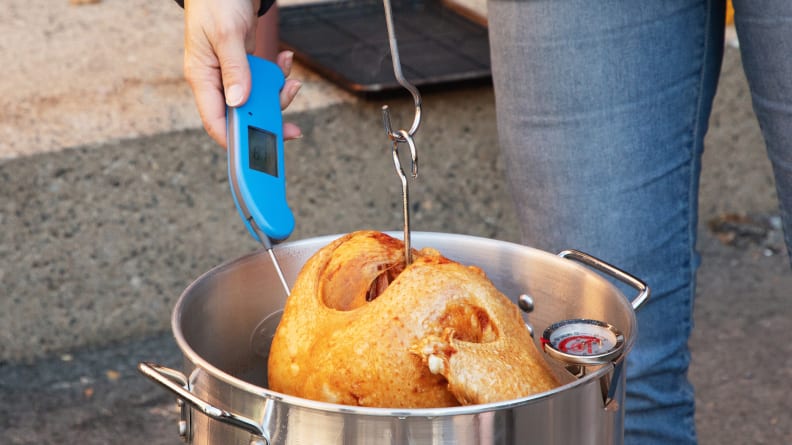A guide to (safely!) making deep-fried turkey
Achieve crispy skin without any hiccups
 Credit:
Reviewed / Timothy Renzi
Credit:
Reviewed / Timothy Renzi
Products are chosen independently by our editors. Purchases made through our links may earn us a commission.
So you're sick of boring, dry, roasted turkey and ready to spice things up this Thanksgiving. Why not give deep-fried turkey a try?
Although this method gets a bad rap (for some, just the thought of it conjures depictions of explosions and dangerous flames), it's actually fairly simple. In fact, it's one of the fastest ways to cook the hefty bird, and it yields tender, crispy results that'll elevate your whole meal.
But taking the right precautions beforehand is crucial. Just make your checklist, gather the appropriate gear, and you can soon serve up a mouthwatering holiday centerpiece that'll have your guests going in for seconds.
Deep-frying a turkey: What you need to know

It's always good to have extra hands around to help out with handling the bird.
First things first: Be mindful of the fact that deep-frying a turkey is an outdoor-only task, and it’s inherently dangerous. That means it requires the cook's utmost attention, and you should probably skip out on that early afternoon glass of wine (or keep the beverages non-alcoholic until the turkey's cooked).
Secondly, and equally as important: Your turkey must be fully thawed and dry, inside and out, before frying. That means if you bought a frozen turkey for the big day, it needs to be fully thawed (for about three days in the fridge) before it's ready to be put in the fryer.
Pro tip: Hidden ice chunks inside the bird can be the cause of an explosion, which is why it’s extremely important to be sure the inside of the turkey is completely thawed, dry, and void of any ice pieces. Of course, using a fresh turkey is the best option, if you can obtain one from a local farm or butcher.
A 12- to 13-pound turkey is an ideal size for ensuring that it will both fit in your cooking vessel and cook all the way through without burning the wings in the process.
After it's thawed, we recommend thoroughly patting it dry (including the cavity) and seasoning it with a dry brine before storing it overnight, uncovered, to lock in moisture and flavor. (You can also experiment injected flavors if you want to get fancy.)
During our fried turkey endeavors, we followed this recipe from Serious Eats, which goes in-depth in its description of safely achieving a deliciously crispy bird—from taking safety precautions to achieving the tastiest results.
How much oil to fry a turkey

Deep frying yields seriously crispy, tender results—but it requires buying multiple gallons of oil.
The type of oil you use to deep-fry a turkey matters, because it will need to reach a high temperature without smoking. For this, we recommend peanut oil (thanks to its high smoke point), but vegetable oil is a good alternative for anyone who may be coming to dinner with a nut allergy.
The precise amount of oil you use will depend on both the size of your turkey and the frying pot you use. (You'll want to fill it without exceeding the max fill line, leaving at least three-to-five inches of empty space.) But we recommend stocking up on around four to five gallons of oil. (You can get a better estimate by placing the turkey in your frying pot and filling it with water beforehand.)
How long to deep-fry a turkey

It's a good idea to keep a meat thermometer handy while waiting for your turkey to finish frying.
The general rule of thumb is to keep the turkey in the fryer for about three minutes per pound. You can start checking the internal temperature a bit sooner than that though, and for that you'll need a trusty digital meat thermometer that's accurate and fast-reading.
Remember to take it slow and easy when lowering and lifting the bird from the fryer oil. Yes, the oil is hot, and it will bubble when you add the turkey, but if you follow all of the safety precautions, you can deep-fry a turkey with delicious results. Plus, a good pair of grill gloves protects your hand from potential splatter—and can help keep you calm.
Must-haves for deep-frying a turkey
The bird (of course)
If you want to ditch the grocery store rush—or don't have access to a high-quality butcher—Williams Sonoma offers a whole free-range turkey that ships fresh. You can choose from a range of sizes (though we wouldn't recommend exceeding 12-14 pounds), and it will stay fresh in the fridge for up to seven days. But be sure to order by November 17 for guaranteed Thanksgiving delivery.

For a fresh turkey delivered right to your door, be sure to order from Williams Sonoma by November 17.
A deep-frying kit
We recommend splurging for the King Kooker Propane Outdoor Fry Boil Package, because it includes everything you need to get started, from the 29-quart aluminum turkey pot to the cast iron burner, and turkey rack and hook for easy lifting.
Plus, this set has earned thousands of positive reviews (including from the Reviewed staff, who used it when we made our own deep-fried turkey).

This kit includes almost everything you need to fry your bird on the big day.
A digital meat thermometer
A reliable meat thermometer is essential for all methods of cooking turkey, but it's especially important in this method, when the turkey cooks as quickly as it does. Plus, when a scorching hot 13-pound turkey is dangling mid-air, you want to get the fastest read possible.
That's why we love the Typhur InstaProbe thermometer, which delivers accurate results in under a second and boasts a large digital screen for easy viewing. But for a more budget-friendly option, the ThermoWorks ThermoPop is another great option that only takes a few more seconds to deliver reliable results.

Our favorite digital meat thermometer delivers accurate results fast.

This thermometer is a great budget-friendly pick for reliable temperature reading.
Plenty of frying oil
As mentioned earlier, the type of oil you use when frying matters. Peanut oil has a very high smoking point, which makes it a particularly great option for high-temperature cooking.
Vegetable oil has a slightly lower smoking point, but it's still a good option for deep-frying, especially if you're hosting someone with a nut allergy. Plus, it typically comes with a smaller price tag.

Peanut oil is our go-to pick for deep-frying.

Vegetable oil is a more budget-friendly option for frying.
Heat-resistant gloves for safe handling
Although you should be using a turkey rack and hook for easily (and safely) transferring the bird to and from the pot, it's a good idea to put on a reliable pair of heat-resistant gloves to protect your hands during the process.
The Comsmart BBQ Gloves are heat resistant up to 1472°F, making them particularly great for when your hands are lingering over a pot of hot oil. These have earned a glowing 4.5 stars from almost 10,000 Amazon reviewers who praise their comfort, fit, and reliable protection. Plus, when grilling season rolls around again, they'll get plenty of use!

Protect your hands during the frying process with these reliable gloves.
Fry away powder to easily dispose of the oil
When all is said and done, and your beautiful fried turkey is ready to plate at the center of the table to wow your guests—don't forget about that giant pot of leftover oil sitting in the backyard.
Of course, you should never dispose of oil down the drain, as that can lead to myriad plumbing and environmental issues. That's why we like to reach for Fry Away powder, which solidifies oil so that it can be tossed with the rest of your waste.

Dispose of your leftover oil easily with this solidifying powder.
A fire extinguisher … just in case
If you follow all of the important safety rules for deep-frying turkey, you don't need to worry about anything suddenly bursting into flames. Still, it's never a bad idea to keep a fire extinguisher handy—especially if this is your first time trying out the technique. (Even if it's just for peace of mind's sake!)

It's always a good idea to have a fire extinguisher at home (and within reach).


